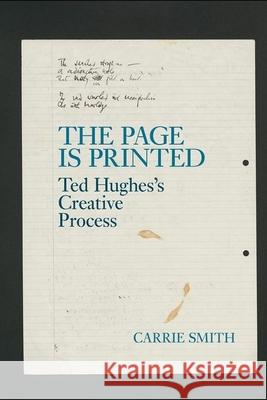The Page is Printed: Ted Hughes's Creative Process: 2021 » książka
The Page is Printed: Ted Hughes's Creative Process: 2021
ISBN-13: 9781800855359 / Angielski / Twarda / 2021 / 256 str.
The Page is Printed: Ted Hughes's Creative Process: 2021
ISBN-13: 9781800855359 / Angielski / Twarda / 2021 / 256 str.
(netto: 531,92 VAT: 5%)
Najniższa cena z 30 dni: 542,72
ok. 30 dni roboczych.
Darmowa dostawa!
Does it matter when and where a poem was written? Or on what kind of paper? How do the author’s ideas about inspiration or how a poem should be written precondition the moment of putting pen to paper? This monograph explores these questions in offering the first full-length study of Ted Hughes’s poetic process. Hughes’s extensive archives held in the UK and US form the basis of the book’s unique exploration of his writing process. It analyses Hughes’s techniques throughout his career, arguing that his self-conscious experimentation with the processes by which he wrote profoundly affected both the style and subject matter of his work. The book considers Hughes’s changing ideas about how poetry ‘ought’ to be written, discussing how these affect his creative process. It presents a fresh exploration of Hughes’s major collections across the span of his career to build a detailed illustration of how his writing methods altered. The book thus restores the materiality of paper and ink to Hughes’s poems, reading their histories, the stories they tell of their composition, and of the intellectual and creative environments in which they were gestated, born and matured. In the process, it offers a template for new approaches in authorship studies, reframing one of the twentieth century’s most iconic literary figures through the unseen histories of his creative process.











